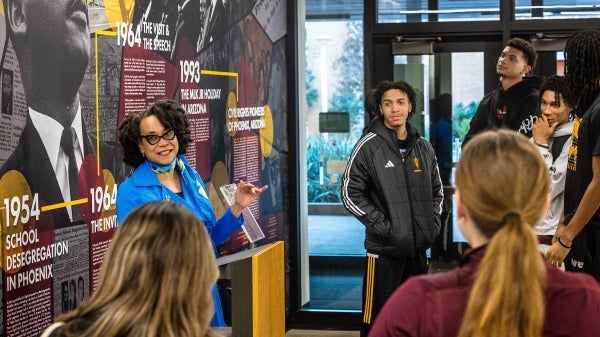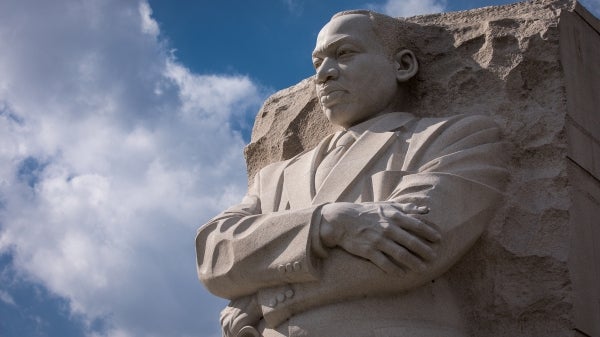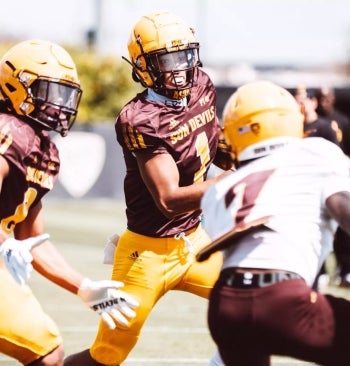ASU wide receiver Xavier Guillory driven by faith, family and heritage

ASU redshirt senior wide receiver Xavier Guillory (center) scores a touchdown during Territorial Cup game against University of Arizona in Tucson on Nov. 30. Photo by Emma Fitzgerald/Arizona State University
It’s a few minutes into the Zoom call when Arizona State senior wide receiver Xavier Guillory is asked about his father.
He looks up and keeps his gaze there, as if he’s picturing his father, Raphael, and thinking of all the things they did together.
The five-mile runs in 100-degree heat. The long drives from Spokane, Washington, to play 7x7 tournaments in Bellevue. The hours they spent shooting hoops or playing catch or, sometimes, just talking.
Thinking, too, of that November day in 2020 when Raphael died of colon cancer. Guillory was 19, uncertain what to do next or if he even wanted to continue playing football. Now, four years later, he knows one thing: The reason he works as hard as he does every day is because that’s exactly what Raphael would expect of him.
“I want to do it to honor the Lord and honor my dad,” said Guillory, who caught two touchdown passes in ASU’s Big 12 Championship game win over Iowa State.
“I’m able-bodied, and I know what it looks like when your health is taken away because I saw it with my dad. Cancer doesn’t discriminate. It doesn’t care about you. It doesn’t matter if you’re a good person or a bad person. So if I’m able-bodied right now, I want to go do it for the people that can’t.”
This isn’t a story about a football player, although that’s how Guillory is defined by most Sun Devil fans. It’s about a young man with an old soul and why Guillory is driven to make the most of every minute.
Start with his faith. Following his touchdowns against Iowa State, Guillory pointed to the sky. When asked about the gesture at the postgame press conference, Guillory thanked the interviewer for bringing it up.
“I’m glad you asked that,” he said. “The Lord brought me through so much. Brought these guys through so much. It’s a testament when we show our faith. It’s most important to me. ... Anytime I get a chance in the end zone, I’m going to give a nod to the Lord. I appreciate you asking that question. It means a lot to me.”
So does, in a different way, Guillory’s heritage. He’s a member of the Nez Perce tribe, a federally recognized tribal nation in Idaho with more than 3,500 citizens. (Guillory was born in Lewiston, Idaho.)
Guillory believes too many people view Native Americans as “historic figures” in a classroom book — “We’re something you read about,” Guillory said — or as tropes perpetuated by the entertainment industry.
“That we’re a bunch of drunks and all these other things,” he said.
It’s important, he said, that he represents traits others fail to consider when they think of Native Americans: A strong work ethic. Humility. Success.
“Once we’re given resources, we can be just as successful as any other person,” he said. “That’s why it means so much to me when I’m able to be on one of those stages that people don’t think about. Just defying odds.”
It was Raphael who helped push Guillory onto those stages. The family moved from Idaho to Spokane, Washington, when Guillory was 5 years old, and soon after, Raphael recognized that his son was blessed with a special athleticism.
Raphael encouraged Guillory to develop that gift — “When other kids would go to the water park, my dad and I would be running five miles in the heat,” Guillory said — but never did the father make the son do something he didn’t want to do.
“It wasn’t something I was crying over,” Guillory said. “I had so much energy, I wanted to do it.”
Guillory started running cross-country in second or third grade (he can’t precisely recall). After every practice, he’d come home and tell his father he was beating all the sixth graders. Raphael didn’t believe him — until he came to practice one day and saw Guillory doing exactly that.
“Then he was like, ‘OK,’” Guillory said. “So he put me into track, and I started killing everybody. I could run like a horse. And then I got into football and scored the first time I touched the ball. He saw something in me, and he just kind of let me gravitate towards it.
“When I got to be about 13 or 14, he didn’t even have to tell me to go work out. I loved it so much. It was like the Lord put something in my heart to where I wanted to get better, and I was having fun with it.”
It was October 2019 when Raphael sat Guillory down in the family living room and told him he had cancer. But he reassured Guillory, too.
“I’m going to watch you play college football,” Raphael said to him.
Raphael never got that chance, though. He died 13 months later, and as Guillory watched his mom and four sisters try to cope, he started to think that catching a football was a selfish act.
“Why am I over here (at Idaho State) playing football, chasing this dream, when my mom is struggling to pay the bills, and my sisters are trying to work through their depression?” Guillory said.
But Guillory thought about one of the last moments he had spent with his dad. Raphael had lost nearly 100 pounds. The strong, vibrant man who had run alongside Guillory mile after mile was “just skin and bones,” Guillory said.
As they talked, Raphael started crying.
“Son, I don’t like it when you come home because I don’t want you to see me like this,” Raphael told him.
Raphael’s resolve was still strong, though. The journey he and Guillory had started on years ago had to continue.
“He told my mom he didn’t want any of us to quit what we were doing,” Guillory said. “He didn’t want us to give up on where we were trying to go.”
So here Guillory is, his college career coming to an end, and an NFL career he hopes is just around the corner.
“I’m going to take full advantage of this,” Guillory said. “Because that’s what has been instilled and gifted in me.”
More Sun Devil community

ASU connects younger, older generations to ease loneliness
When Pencie Culiver sits down on a bench every Tuesday outside Coor Hall, the students are drawn to her and her big sign that says, “I’m All Ears.”She soothes their sorrows, delights in their joys…

Local athletes get crash course on Black history in Arizona
Basketball players from Arizona State University and the Valley Suns gathered on Jan. 6 to learn about Black history in Arizona and Martin Luther King Jr.’s visit to ASU's Tempe campus in 1964.The…

ASU names 2025 MLK Servant-Leadership Award recipients
The 2025 honorees have been named for Arizona State University's annual MLK celebration awards.The four awards — community, faculty, staff and student — recognize leaders who dedicate themselves to…

